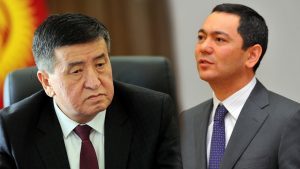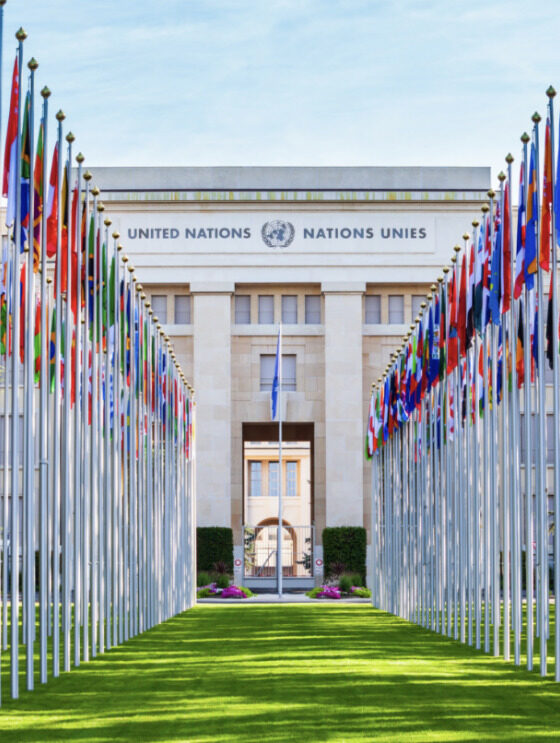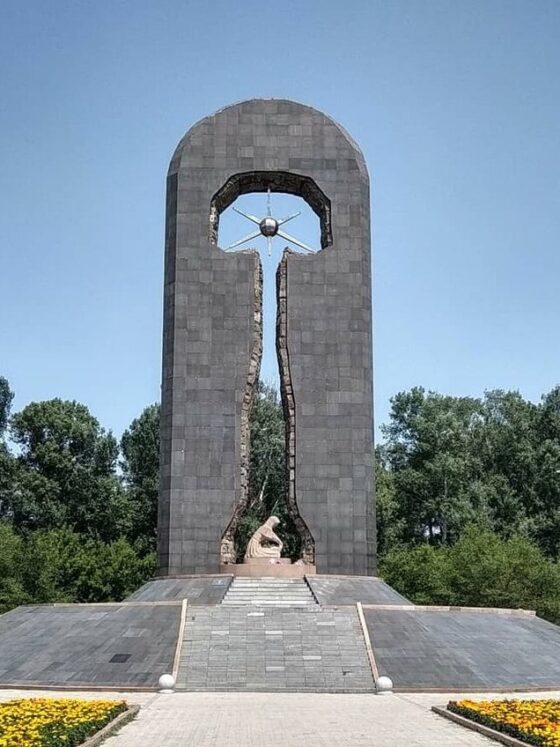Bruce Pannier, a correspondent of RFE/RL (Radio Free Europe / Radio Liberty) and author of the blog Qishloq Ovozi, shares his opinion on the upcoming presidential elections in Kyrgyzstan.

What is the prevailing mood among people in Kyrgyzstan two months prior to October? What do they expect from the next election?
I would say that unfortunately, as has been true in previous elections, the sideshows are dominating the political news ahead of the election. There are court cases against members of the Ata-Meken party, including party leader Omurbek Tekebayev; there are court cases against media outlets and journalists, notably Zanoza and Naryn Aiyp (Idinov). Since official campaigning is not supposed to start until September, these are the issues that are currently dominating the news. The people of Kyrgyzstan have been through this before. There will likely be protests supporting candidates that are barred from running, Tekebayev being one example, but with so many people declaring their intention to run, there will almost certainly be one—or more—who fail to meet some regulation, or are excluded on some legal grounds. Such actions usually trigger protests, although Bishkek city authorities have prohibited demonstrations in the capital until after the first round of the presidential election. It remains to be seen if this can really prevent rallies and demonstrations. There is sufficient precedent to suggest that such an edict will not keep people from taking to the streets. So I think the prevailing mood is: wait, for now, and see what develops.
Expectations for the next president are probably not high. The people of Kyrgyzstan have heard many promises in the past. On the other hand, some projects are starting to bear fruit, power transmission lines like Kemin-Datka are already bringing some improvement to the lives of the people, and Gazprom’s ownership of Kyrgyzstan’s gas network appears to be bringing some positive change. Whoever is president, projects such as these will likely continue.
Which of the political factions in Kyrgyzstan enjoy popular support from the electorate? And which segments of the population are the most and least active as voters?
This is a tricky question to answer. There are regional interests and even very local interests, as well as business interests, both legitimate and criminal. There has to be some compromise between north and south, for example. A president who comes from northern Kyrgyzstan really needs someone close to him, or her, who represents the interests of people and groups in the south, and vice versa if the president is from the south. That said, the Social Democratic Party of Kyrgyzstan (SDPK) seems well-positioned to drum up support around the country. The SDPK will be helped by its “stalking horse,” the Kyrgyzstan Party, which has already said it will back the SDPK nominee: current Prime Minister Sooronbai Jeyenbekov. President Almazbek Atambayev has already endorsed Jeyenbekov—no surprise, since Atambayev is from the SDPK but was constitutionally bound to relinquish his party affiliation as president. Many people identify the SDPK as “Atambayev’s party” and will likely vote for the SDPK candidate, just as they did in the 2015 parliamentary elections.
 The leader of the Respublika party, Omurbek Babanov, is a northerner (born in Talas Province), but has a good reputation pretty much throughout Kyrgyzstan. Babanov is a businessman, and as such will likely appeal to the business community. He is also seen as coming from outside politics, which appeals to many who are weary of the career politicians who have occupied top spots in the government since independence. Since I don’t have time to run through all the likely candidates and their support bases, I will say that voting is generally heaviest in Kyrgyzstan’s secondary and tertiary cities and in towns and villages. Turnout in Bishkek tends to be around 50%, and has been much lower in some cases; in Osh, the figures are not much higher. Minority groups seem to be voting in decreasing numbers. I would not expect many people from the Uzbek community, for example, to show much interest in the presidential election. To Kyrgyzstan’s credit, the country’s youth do seem to show enthusiasm at election time, and I would expect a large turnout from the 18-30-year-olds, or at least the ethnic Kyrgyz in this age range. The spoiler here is that votes can be bought, and in some places the cost is not much.
The leader of the Respublika party, Omurbek Babanov, is a northerner (born in Talas Province), but has a good reputation pretty much throughout Kyrgyzstan. Babanov is a businessman, and as such will likely appeal to the business community. He is also seen as coming from outside politics, which appeals to many who are weary of the career politicians who have occupied top spots in the government since independence. Since I don’t have time to run through all the likely candidates and their support bases, I will say that voting is generally heaviest in Kyrgyzstan’s secondary and tertiary cities and in towns and villages. Turnout in Bishkek tends to be around 50%, and has been much lower in some cases; in Osh, the figures are not much higher. Minority groups seem to be voting in decreasing numbers. I would not expect many people from the Uzbek community, for example, to show much interest in the presidential election. To Kyrgyzstan’s credit, the country’s youth do seem to show enthusiasm at election time, and I would expect a large turnout from the 18-30-year-olds, or at least the ethnic Kyrgyz in this age range. The spoiler here is that votes can be bought, and in some places the cost is not much.
What is the probability that Kyrgyzstan’s election will be fair this time? Have the necessary conditions and institutions for a fair election process been created?
It remains to be seen whether all the primary contenders will be registered to compete. Again, Tekebayev seems headed toward being barred from competing, and there is still ample time to engage in black PR against other candidates, or for some legal entanglements to “suddenly” surface and prevent a candidate from running (or at least from devoting their full attention to the campaign). The conditions for a free election are probably there but paid protesters could upset the competition and vote-buying could upset the election results. One of the losing candidates will almost certainly cry foul and demand a recount, or annulment of the results, though previous efforts toward these have always come to nothing. And of course, there is the biometric ID system. Some people were afraid to give their data before the 2015 parliamentary elections and there were some glitches in the system.
Will all 59 candidates participate in the race? Even if not all, how important is the diversity and number of candidates for voters?
Not a chance—already the number is down to around 50. I would expect no more than five to maybe eight candidates to make it to Election Day. I think most people in Kyrgyzstan would consider that an acceptable number
In your opinion, which of the presidential candidates has the most realistic shot at winning the election in October and why?
I think Babanov. He is polling well and, as mentioned, he enjoys a reputation as something of a political outsider, though he has been prime minister. He is relatively young and charismatic. Jeyenbekov has the support of the SDPK and the Kyrgyz president. If he can swing a deal with this new bloc that is emerging—Tashiyev. Kelibekov, Madumarov, and Torobayev—such support could put him up there with Babanov. The same is, in theory, true for other candidates. Kyrgyzstan has a long history of political mergers in the run-up to elections, notably the Respublika-Ata-Jurt union before the 2015 parliamentary elections, and the same has been true for individual candidates. Remember the Bakiyev-Kulov tandem in 2005?
Why do you think the government will not use administrative force to promote Jeyenbekov?
We have yet to see if that is true, and there have already been accusations of “adminresursy” being used. The Central Elections Commission has looked into the allegations and decided that things like Jeyenbekov being shown traveling around Kyrgyzstan or paying an official visit to Turkey did not constitute misuse of administrative resources because Jeyenbekov was prime minister at the time and received the coverage while performing his official duties.
One problem is that the term “administrative resources” has many interpretations. Jeyenbekov has to campaign and there will be questions about where the money is coming from—or whether he has access to voters that other candidates do not seem to have. Does he have access to facilities to hold rallies that some other candidates do not?
Kyrgyzstan’s media and the voters will be watching for hints that administrative resources are being used to support Jeyenbekov’s candidacy, so I think he would want to try hard to avoid any such suggestions.
Almost certainly.
The polls I have seen show Jeyenbekov lagging far behind Respublika leader Omurbek Babanov. In fact, Jeyenbekov is in a pack with a few other candidates, none of whom ever get double-digit support according to these polls from Kyrgyz media, whereas Babanov always is in double-digits.
So that’s one problem.
The manner of a Jeyenbekov victory would also be important.
If he were to win outright in the first round, it would be a big problem. The polls I mentioned— and I know polls have been wrong in a lot of places in recent months—indicate he could not possibly get the more-than-50% of the vote needed to win.
If that happened, many of Kyrgyzstan’s political parties and civic movements would probably create some tension, and we know what has happened before when Kyrgyzstan’s people thought dirty politics were cheating them.
The more likely scenario for a Jeyenbekov victory would be that there is a second round and Jeyenbekov faces only one competitor.
The political parties now without candidates in the second round are in a position to negotiate support for a candidate.
Jeyenbekov could win legitimately in a second round if he could make deals with enough of these other political parties.
Of course, the party whose candidate lost, and the parties and movements that supported that candidate, will cry foul, list violations somewhere in campaigning or voting, and demand a recount or even an annulment of the election results.
How do you assess the media coverage of the election campaign?
Elections are when Kyrgyzstan’s media really shines and sets itself apart from the other Central Asian countries.
Kyrgyz media outlets have covered preparations for the election, the actions and words of the frontrunners, the trials of politicians who want to run in this presidential election, statements from the Central Election Commission, accusations from politicians about other politicians, pretty much everything.
That said, the ongoing trials of some media outlets and their journalists—Zanoza, for example—are disturbing at any time, but in the run-up to an election it could lead, and in this case has, to speculation the authorities are sending a warning that some topics are off-limits.
It must be mentioned that the media outlet trials officially stem from reasons other than the upcoming presidential election. Most were instigated on charges of insulting the honor and dignity of the president.
What is your assessment of president Almazbek Atambayev’s term in office? What changes occurred in the Kyrgyz Republic during his presidency?
Almazbek Atambayev became president at the end of very turbulent times in Kyrgyzstan. The revolution in April 2010 and the interethnic violence in southern Kyrgyzstan in June 2010 really put Kyrgyzstan on edge. Additionally, the new constitution (adopted in 2010) changed Kyrgyzstan’s political system from a presidential form of government to a parliamentary form of government. Given that backdrop, Atambayev deserves some credit for maintaining stability in Kyrgyzstan for six years. Kyrgyzstan also faced some challenging economic times, due in large part to Russia’s economic woes, which of course affected remittances from Kyrgyz nationals working as migrant laborers in Russia. Kyrgyzstan weathered the economic difficulties better than the hydrocarbon-exporting Central Asian states (Kazakhstan, Turkmenistan, and—to a lesser extent—Uzbekistan), and while Kyrgyzstan’s economy could not be described as “booming” it has held steady, though this is due at least in part to Chinese loans and investment. Some of the major events during Atambayev’s tenure include completion of the Datka-Kemin power line and the sale of Kyrgyzgaz to Gazprom, both of which have improved the distribution of power to citizens and probably will continue to do so for years to come. The U.S. military base at Kant was closed down, removing a source of discontent for many citizens of Kyrgyzstan. Kyrgyzstan was admitted as a member of the Eurasian Economic Union, but the benefits of this are still unclear, though it has already removed some of the obstacles for the country’s migrant laborers in Russia. The parliamentary system of government remains in a nascent stage as Atambayev departs office; he bears some blame for helping to preserve the powers of the executive branch. I did not see any strong efforts by Atambayev to push the parliamentary system forward. The legal cases he initiated or inspired against political opponents, media outlets, and journalists will no doubt tarnish his reputation as president, but I think on the whole his tenure in office will be remembered as a time a relative stability and slight economic improvement.













